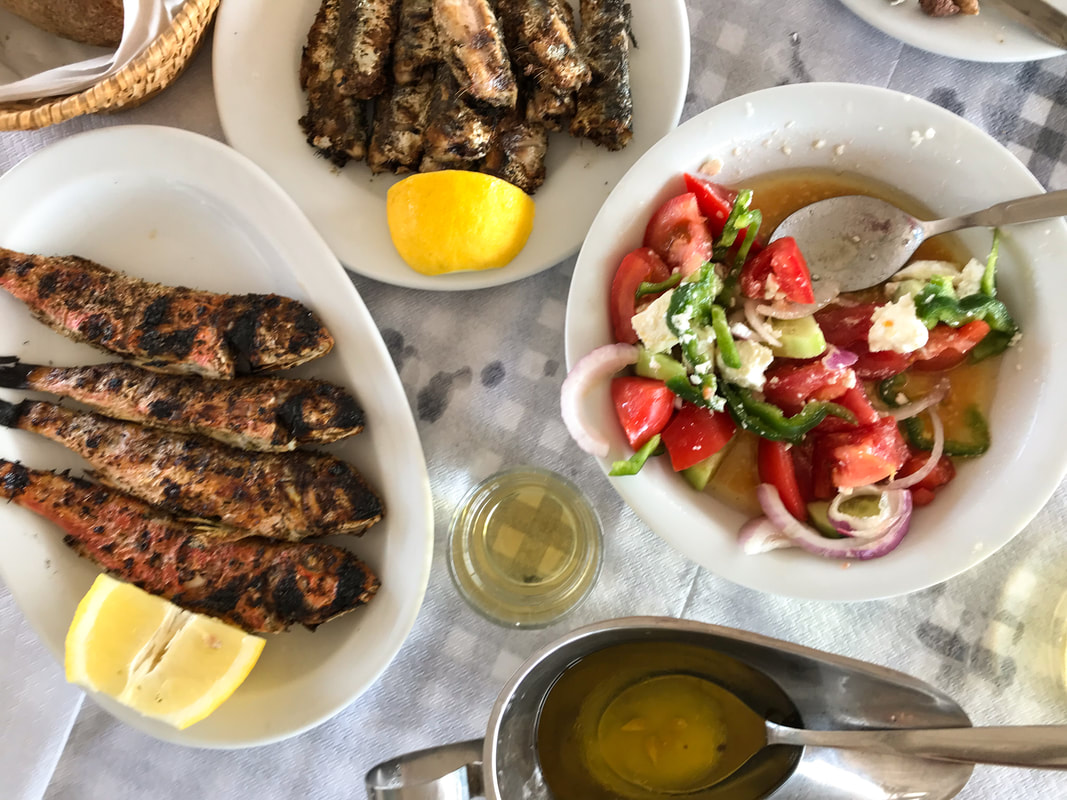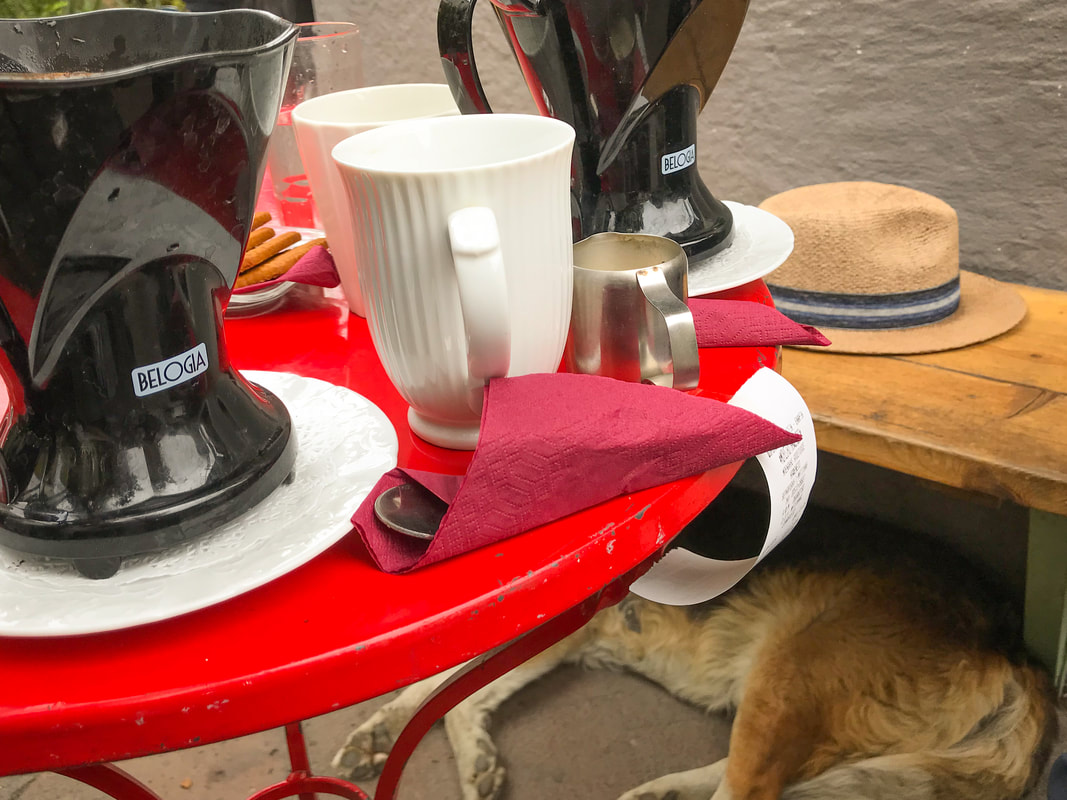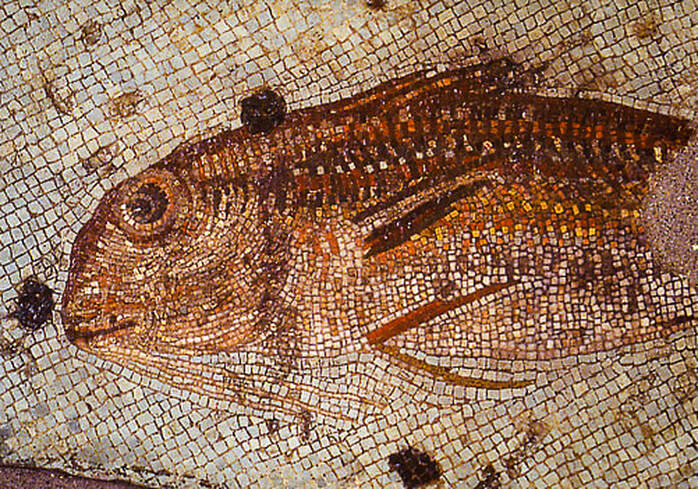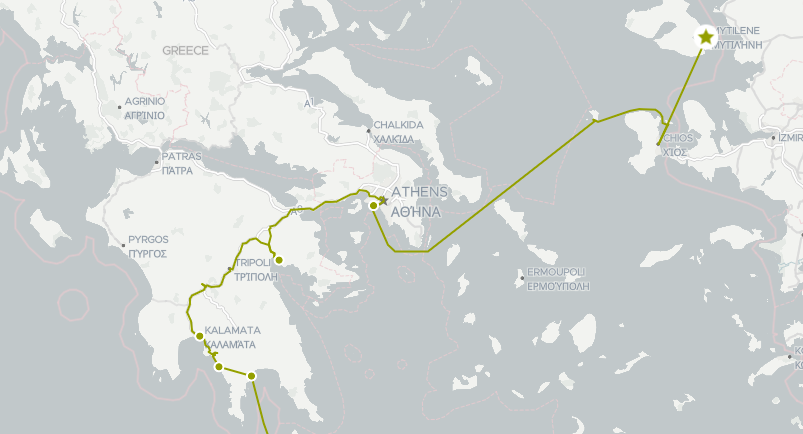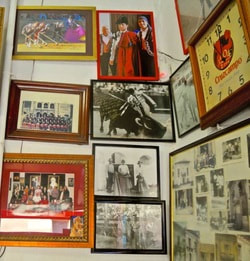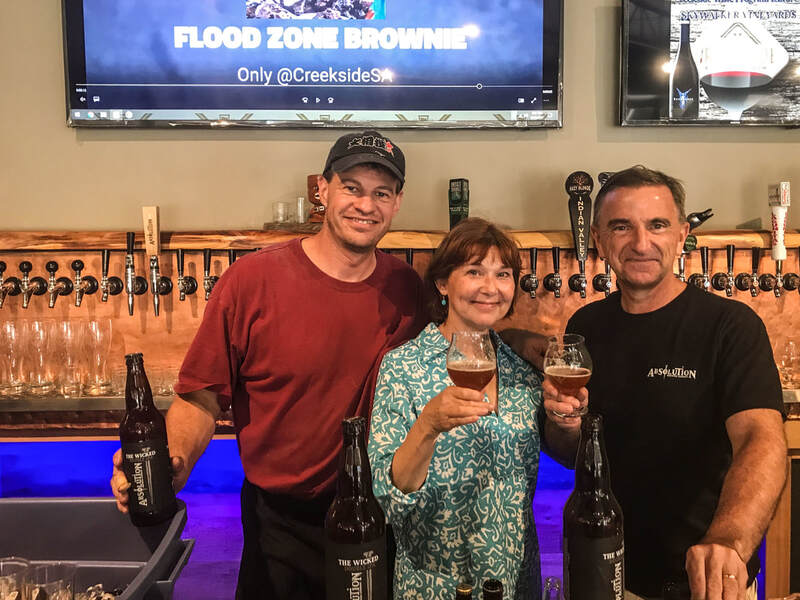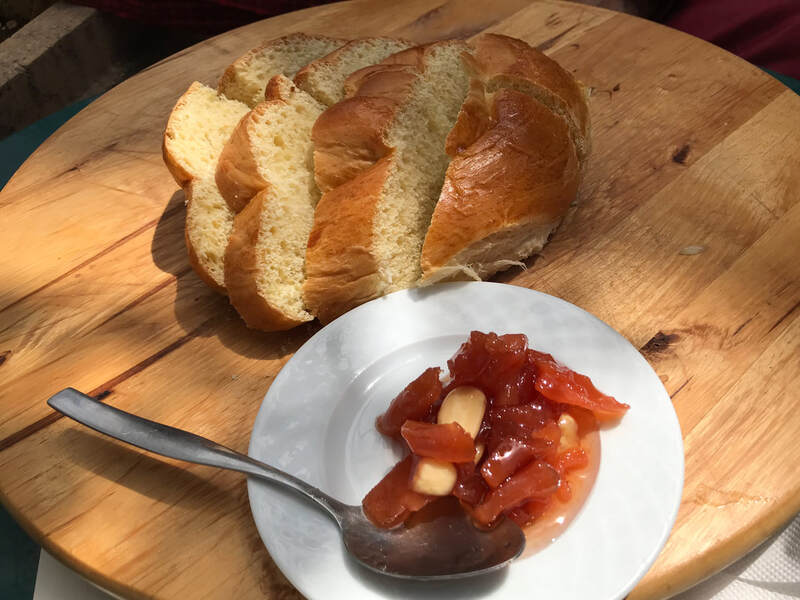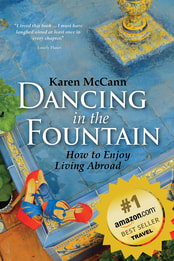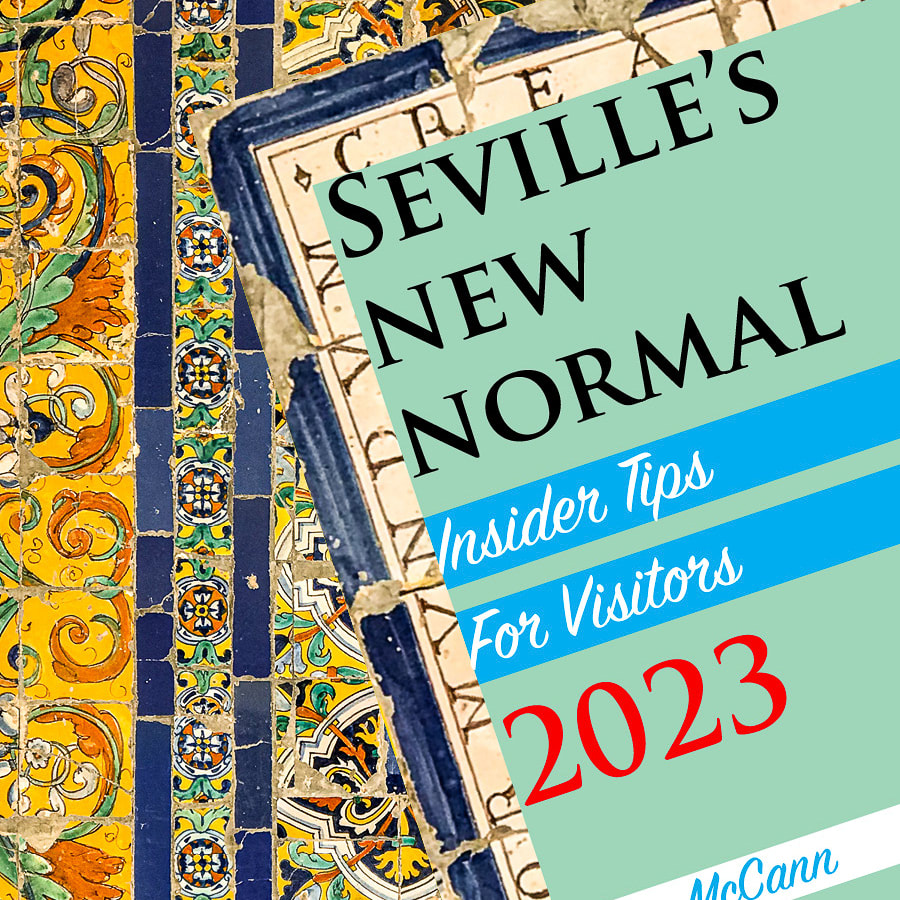|
“I can't think of anything that excites a greater sense of childlike wonder,” said travel writer Bill Bryson, “than to be in a country where you are ignorant of almost everything.” Few countries offer more golden opportunities for feeling utterly ignorant than Greece. The written language alone makes you feel like a toddler, staring at random shapes of letters that seem to be dancing before your eyes. The wonderment goes up exponentially when you take an overnight ferry from the mainland to arrive on a distant island shortly after dawn and before coffee. "Τώρα φθάνουμε στη Λέσβο,” announced the loudspeaker. We are arriving in Lesbos. Rich and I grabbed our bags and headed down the gangplank to the port city of Mytilene. The air was sweet and balmy, the light luminous. Was I thinking of Aristotle, Sappho, and all the brilliant minds who’d passed this way before me? Nope, I was seeking coffee. Fortunately, as the Greeks are as deeply attached to their καφές as the most passionate Starbucks addict, it took less than a minute to find a café. When the caffeine enabled me to gather my wits sufficiently, I asked, “How far is the hotel?” “About a half hour’s walk.” It was closer to 45 minutes, with the last bit uphill followed by three sets of stairs. But it was a wonderful walk, along the vast curve of the harbor where fishing boats bobbed, whistling young men pushed carts of supplies, ancient Vespas puttered by, women readied tables at wharf-side restaurants, and old men sat nursing thick ceramic mugs and hand-rolled cigarettes. Just about every café seemed to have an old dog sleeping at the threshold. The buildings were a jumble of styles: Mediterranean, old stone, Western European, ornamental Byzantine, and of course, a few boxy, 1960s-style concrete buildings because hey, this is the real world. Our hotel was a converted 1916 mansion, and I was charmed to discover we were in a tower room, one that was perfectly round, like something in a fairy tale. We deposited our bags and set out to explore the town. We soon found ourselves on Ermou Street, which was much like Harry Potter’s Diagon Alley — a blast-from-the-past jumble of fishmongers, cobblers, confectioners, and shops selling old books, Kodak film, DVDs, and “curiosities.” Presiding over one end of the street was the magnificent church of Saint Therapon the Wonderworker, a 7th century Palestinian refugee who had such a knack for curing the sick that his miracles are still much in demand today. At the other end of Ermou Street was the old harbor and some fish restaurants; lunch instantly moved to the top of our agenda. We settled at a wooden table covered with a blue checked cloth and studied the menu. Grilled sardines, we decided, and at the waiter’s urging, a fish I’d never tried before: red mullet. Less romantically known by its common name — the bottom-feeding goatfish — red mullet is a tender, tasty fish that in ancient times rose to an extraordinary trendiness among wealthy Romans. Top specimens were sold for their weight in silver, kept in ponds, and caressed by their owner, who would brag to friends about teaching the fish to come to the sound of his voice. (Having owned goldfish, I can tell you that most fish will come to signals associated with food, so this doesn’t imply special brilliance on the part of red mullets. Or their owners.) Great thinkers of the day — Seneca, Pliny, Cicero —discoursed on the red mullet’s charms, and artists were commissioned to include their image in mosaics. But for us, they were simply lunch. The recipe is ridiculously simple: dust the red mullet with flour and salt, fry in oil, serve with lemon. It’s possible that the island’s most famous resident — the poet Sappho — wrote odes to the red mullet, but we’ll likely never know, as nearly all her work has been lost since her death around 570 BC. Sappho was born to a wealthy Lesbos family and her talent took the ancient world by storm. Many of her poems speak eloquently of love and desire between women, which naturally led to assumptions about Sappho’s own sexuality, giving rise to the term lesbian. This has driven some conservative residents of Lesbos absolutely bonkers, especially with the rise of the LGBTQ movement in the 20th century. In 2008 a group of Lesbos islanders tried to get a legal injunction banning groups from using the world lesbian in their names, claiming it violated their human rights by associating the island with “disgraceful” practices. As you can imagine, they were laughed out of court and have had to satisfy themselves with making sure everyone spells it Lesvos, a more accurate transliteration of the Greek Λέσβο. Despite their best efforts, there’s a modest but growing LGBTQ tourism trade, supported by agencies such as Sappho Travel in Skala Eressos, Sappho’s birthplace. Today, the island’s most famous export isn’t poetry but ouzo, a dry anise-flavored aperitif. Lesbos boasts 17 ouzo factories, some quite large, others no bigger than a kitchen; together they produce half the nation’s supply. We’d heard it was traditional to drink ouzo around sunset and that a good place for this was Kastro Tavern, owned by a magician named Georgios. We arrived at dusk to find Georgios playing backgammon with friends, his dog asleep in the kitchen, and no other customers in sight. “We’d like some ouzo,” I said. “Do you have Kefi?” This popular brand is named for the state of sublime, transformative contentment when everything in the world seems right. “No,” said George. “It is turned off.” He mimed closing a tap. “Two brothers made it, and they …” He made fists and pantomimed punched them together. “No more Kefi.” Well, that’s one for the irony department, I thought. We chose another brand at random. “Ice?” asked George. “Of course,” I said. I’d read that ouzo, which we’d been taking neat, should always be served over ice or with a little cold water, which turns the clear liquid cloudy. Why is this important? I have no idea, but I’m not about to fly in the face of tradition. It’s also meant to be taken with a meze (snack) or two; at 37% to 50% alcohol content, it’s nothing to be trifled with. We ordered white beans and red mullet, and sat sipping, nibbling, and listening to the clatter of dice and the low hum of talk and laughter. Occasionally George’s dog wandered over so Rich could scratch behind its ears. When we eventually bestirred ourselves to ask for the bill, George said, “Would you like to see magic?” He dazzled us with nifty bits of sleight of hand. “The bag is empty, yes? And now…” he flipped cards out of the bag onto our table; we gasped and applauded. And I reflected that the true magic of Greece is this: its ability to make strangers feel they belong, that they are among friends, even when they are very far from home. LEARN MORE ABOUT OUR MEDITERRANEAN COMFORT FOOD TOUR. SIGN UP TO RECEIVE UPDATES AS WE GO. Here's our path from Kalamata, Greece to Mytiline, Lesbos, Greece via bus and ferry. GOT IDEAS ABOUT THE TRIP? SEND US YOUR COMMENTS BELOW!
YOU MIGHT ALSO ENJOY
16 Comments
Andrea
5/16/2019 09:24:23 pm
Looks wonderful and I always love how you describe things KarenXXOO
Reply
Karen McCann
5/17/2019 07:15:58 am
Thanks, Andrea. This is an amazing island, with so much charm and such kind people — it's certainly easy to find things to write about!
Reply
Faye
5/17/2019 12:02:05 am
Who knew about Lesbos and Sappho and ouzo! Love the mural with poetry fragment and lovely mosiac of red mullet. The real thing (fish) looks simply delish. I pray to go there someday!
Reply
Karen McCann
5/17/2019 07:24:19 am
Let me know how you like ouzo, Faye, and whether you wake up with a Greek accent! Love the t-shirt, and the book title. Ouzo is delicious; I like the kind with lots of anise flavor. And it's powerful stuff, which is why you always have it with food — especially octopus, for some reason. Thanks for joining us all along the way on this journey!
Reply
5/17/2019 07:18:59 am
In recent years Lesvos has been the destination of thousands of illegal immigrants and the good Greeks there have struggled with the costs and logistics of making them feel as welcome as you describe feeling. I am curious since so many travel forums ask about the hordes of fleeing souls, what if anything you saw or was said about them.
Reply
Karen McCann
5/17/2019 08:54:25 am
Yes, there has been lots of talk of the refugees, and I 've spoken with people who are here meeting with the Red Cross and others in connection with the issue. One woman told me what it was like when the 28,000 initial refugees showed up and overwhelmed the area. Another said there are several camps here, all desperately overcrowded, but people are being fed three meals a day, although nothing as wonderful as what we're eating I'm sure. You do see beggars in the street (as we did in Kalamata) but it's not a huge number. I've gotten such conflicting information that I didn't feel I could write about it in my post, but I continue to gather data. And yes, I hope you do come here, Jackie, as you and Joel would love it. The food's great and the welcome, as always, a warm one.
Reply
Kitty
5/17/2019 11:05:01 pm
We went to see The Jungle last night based on the refugees in Calais. Lesvos was mentioned so I looked it up and then saw what you wrote. Overwhelmed and overwhelming.
Reply
Karen McCann
5/18/2019 03:47:16 pm
Kitty, today we went to three refugee camps, and have seen so much misery and so much incredible grace and kindness that it was a very powerful experience. Watch for more on this subject in future posts! Thanks, as always, for your thoughtful comments.
Reply
Faye
5/19/2019 01:38:28 am
The refugees are primarily from where?
Tobey Hiller
5/18/2019 03:04:55 am
What a delightful and charming place and piece -- makes me definitely want to visit it!
Reply
Karen McCann
5/18/2019 03:50:19 pm
The great thing is that this island is a bit out of the way, so less overrun by tourists than most. Visitors usually zip through Mytiline and head to the resort towns on other parts of the coast, so this city maintains its character and is well worth a visit. It's so photogenic and worthy of painting, you and Phil would love it, Tobey!
Reply
Karen McCann
5/20/2019 10:50:47 am
Faye, to answer your question, the film Kitty talks about is The New Jungle, a 2017 film shot on a mobile phone about the refugee crisis in Calais, France, as well as Dunkirk and Brussels. One of the main points of the film is that while a huge number of refugees remain in camps, living under often-intolerable conditions, the general public is starting to forget about the refugee crisis. In Lesvos, there are thousands from Afghanistan, Pakistan, and Syria, plus others from various African and Middle Eastern countries. We visited the best (Pikpa) and the worst (Moria) refugee camps and I came away with a lot to think (and write) about.
Reply
Faye
5/20/2019 04:27:54 pm
Thank you, Karen, for taking time to respond. I figured as much but you are right. Those refugees are seldom talked about anymore. Of course, we now have another “crisis of humanity”on our southern border. What is the answer...humane treatment...
Reply
Karen McCann
5/21/2019 07:10:14 am
I'm sorry to say that I believe the refugee crisis is likely to get worse before it gets better. We currently have 65.5 million displaced people worldwide, and as the glaciers continue to melt over the coming decades, millions more will no longer have a viable water source and will be forced to relocate. I agree that the goal has to be humane treatment and less politics ... let's hope the global community steps up to make it happen.
Reply
Deanna Foster
9/18/2019 11:35:26 pm
Your words and photos brought back so many memories! I lived in Mytilene from 1977 - 1978, and visited the island again in 1987. I married my first husband there (he was a native of Lesvos). I was one of only a handful of foreign women living on the island. And yes, I learned Greek!
Reply
Karen McCann
9/20/2019 07:14:18 pm
Living in Mytilene must have been amazing, Deanna, especially back in the seventies. I traveled in some other Greek islands in 1972 and I know that it was incredibly different back then. Hat's off to you for learning Greek; I struggled mightily to acquire just some letters and a few key words. Lesvos is such a beautiful island with lots of varied terrain, including those hot springs (which I heard about but never visited) and some wonderful beaches. So glad this article could bring back happy memories of the island for you!
Reply
Leave a Reply. |
This blog is a promotion-free zone.
As my regular readers know, I never get free or discounted goods or services for mentioning anything on this blog (or anywhere else). I only write about things I find interesting and/or useful. I'm an American travel writer living in California and Seville, Spain. I travel the world seeking eccentric people, quirky places, and outrageously delicious food so I can have the fun of writing about them here.
My current project is OUT TO LUNCH IN SAN FRANCISCO. Don't miss out! SIGN UP HERE to be notified when I publish new posts. Planning a trip?
Use the search box below to find out about other places I've written about. Winner of the 2023 Firebird Book Award for Travel
#1 Amazon Bestseller in Tourist Destinations, Travel Tips, Gastronomy Essays, and Senior Travel
BLOG ARCHIVES
July 2024
CATEGORIES
All
|
